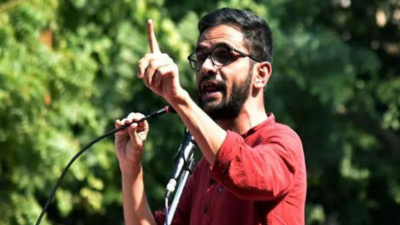
NEW DELHI: Former JNU student Umar Khalid on Friday asked before the Delhi High Court the basis on which the Delhi police made him an accused in a UAPA houses related to the alleged larger conspiracy behind the February 2020 northeast Delhi violence. Appearing before Justices Navin Chwla and Shalinder Kaur, senior advocate Trideep Pais argued no criminality was alleged against many persons who allegedly attended the conspiracy meetings or made phone calls post the violence.
“There was a meeting; bulk of the meeting is not an accused. How am I an accused? There are two from the meeting who are accused? One Sharjeel Imam and myself. How are we accused when others are not?” asked the senior lawyer.
Pais further argued the number of people present at protests, meetings, on calls — none were made an accused.
“What is the basis of making this person or that person an accused is not even known?” he asked.
He referred to Swaraj India leader Yogendra Yadav and filmmaker Rahul Roy who were not accused in the case despite their presence in the alleged conspiracy meetings and a purported WhatsApp group.
“Of the people who made the call (post violence), five are not even made accused. Saba Diwan, Rahul Roy, etc.,” stated Pais.
He went on, “There are other people in that meeting.. With regard to the meeting where there are witness statements, there were other people in the meeting. For example, in the Jangpura meeting, there is one Mr Yogender Yadav. He is not an accused. There is Mr Purushottam Sharma. He is not an accused. There is one woman called Tahir Daud.”
Apart from hearing arguments on behalf of Khalid, the bench heard submissions of counsel appearing for RJD youth wing leader and Jamia Millia Islamia student Meeran Haider.
Khalid, Imam and several others have been booked under the Unlawful Activities (Prevention) Act (UAPA) and IPC provisions for allegedly being the “masterminds” of the February 2020 riots, which left 53 people dead and over 700 injured.
The violence erupted during the protests against the CAA and NRC.
After the dismissal of his bail plea by the high court in October 2022, Khalid moved court for the second time seeking bail in the case.
Khalid, who was arrested by the Delhi police in September, 2020, has assailed a trial court order refusing to grant him bail in the case.
Pais informed the court that he was seeking bail on the grounds of long period of incarceration — over four years — without trial and parity with co-accused Devangana Kalita, Natasha Narwal, Asif Iqbal Tanha and Ishrat Jahan, who were out on bail.
It was emphasised that Khalid was not even in northeast Delhi when the violence took place, and on the contrary, he advocated the “Gandhian principle” of non-violence in the speech delivered several kilometres away from the capital in Amravati which was labelled as “provocative” later.
“There is no recovery from me or at my instance. There is no physical evidence to show my complicity. There is no allegation of procurement, raising of funds. There is no allegation of terrorist act,” Pais said.
He further said Khalid was discharged by the trial court in the second case against him in relation to the riots and his interaction in the protest WhatsApp groups was limited to a few instances.
Haider’s counsel sought bail on the grounds of his long incarceration and parity while denying allegations of facilitating finances for the violence.
“They conflate protests with riots…There is no recovery of any physical weapons or any other device (from me),” the lawyer argued.
Haider was arrested on April 1, 2020.
Besides these two bail pleas filed this year, co-accused Sharjeel Imam’s bail plea is pending in high court since 2022, and were heard by different benches from time-to-time.
The matter would be heard on December 12.



















